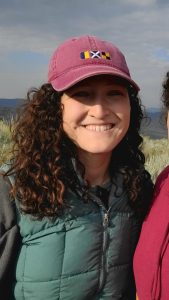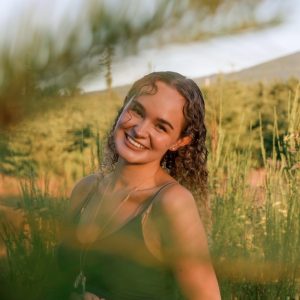U Students Share Experiences Navigating the OEO Process
(Design by Sydney Stam | The Daily Utah Chronicle)
February 7, 2023
A second-year mathematics major at the University of Utah reported sexual misconduct to the university’s Office of Equal Opportunity in December 2021. She said she wouldn’t do it again.
“I felt very hopeful at the beginning of my case,” she said. “I think at the start, they were good at making you feel like it would be a fair trial and getting you resources to help through the process.”
The student wishes to remain anonymous due to fear of retaliation from the student whom she reported, and will be referred to as “Student A” throughout the remainder of this article.
What Happens When OEO Receives a Report
Under university policy, which is consistent with Title IX Regulations, OEO offers supportive measures to anybody who reports sexual misconduct. Examples of supportive measures include referral to the counseling center, providing a campus safety escort, housing adjustments and academic accommodations.
In Student A’s case, her counselor continues to provide a cross-schedule check each semester in an effort to avoid unwanted contact with the person accused of the behavior (the respondent).
Sherrie Hayashi, the university’s Title IX coordinator and OEO director, said there is a mandatory reporting policy regarding discrimination and sexual misconduct for various sources, including faculty members. Because these reports are mandatory, there is a wide range in types and severity.
OEO received 1,333 of these reports over the past two years. These reports and how they’re handled are different from reports brought by individuals who experienced the alleged misconduct, like Student A.
“Regardless of whether they want to file a formal complaint, supportive measures are always available to them,” Hayashi said. “We also talk to them about measures that they can take to hold somebody accountable.”
Criminal processes are explained to the individual as one avenue to hold someone accountable. If an individual chooses to go that route, they are referred to the University Police Department or the agency in the appropriate jurisdiction.
To pursue accountability measures within the university, the individual must file a formal complaint with OEO by submitting an intake form. According to a report provided by Hayashi, OEO accepted 61 formal complaints of sexual misconduct in 2021 and 2022.
For a formal complaint about sexual misconduct to be accepted, it must allege a violation of the university’s non-discrimination policies, and the respondent must be a member of the university community.
Student A was a freshman when she filed a formal complaint on Dec. 3, 2021, alleging her ex-boyfriend raped her in July when they were still in a relationship. When the alleged misconduct happened, neither of them were attending the U, but they had each applied and been accepted to attend that fall.
“The other part [for a formal complaint to be accepted] is that the behavior has to somehow impact someone’s either university program or activity,” Hayashi said.
Examples of this include attending the same classes or even using the same exercise facilities in the Student Life Center.
Student A said after the incident, she lost a scholarship and started taking antidepressants.
“My mental health was just so bad that I just couldn’t get myself to go to class,” she said. “I was also terrified to be on campus because I would see him. So I just avoided school as much as I could.”
OEO notifies the individual by email if their formal complaint has been accepted or denied. In the case of denial, individuals can appeal to the director.
The Formal Complaint Process: Initial Investigation
Student A received a follow-up email on Dec. 7 to schedule a meeting where she could learn about her options. By Dec. 21, a summary of the complaint and allegations was issued to the respondent.
Between that time, Student A requested a No Contact Directive that was granted, prohibiting both parties from approaching or communicating with each other. If breached, consequences could include being expelled from the U.
In January 2022, OEO was still sorting out jurisdiction over the case since the parties were not yet students when the alleged behavior occurred. This pushed back the investigation, which concluded on May 31, nearly six months after Student A filed her complaint. The final report from the investigation concluded that there was insufficient evidence.
When the other party claimed that Student A was mentally unstable and that they’d begged her to get help, she submitted medical records which indicated she had regular doctors’ visits throughout the relationship. She had multiple witnesses she had shared the incident with and a selection of text messages with the other party relating to the event.
“They rejected a lot of my evidence for relevance,” Student A said. “And then [the respondent] also got a letter [admitted into evidence] from his church pastor saying, ‘Oh he would never do this, he’s such a good kid.’”
In 2021 and 2022, on average, sexual misconduct cases handled by OEO took 95 days from the complaint being accepted to the OEO outcome. That average includes cases that were dismissed or reached an alternative resolution outside of an investigation. Investigated cases that were found to have insufficient evidence, like Student A’s, took an average of 129 days.
“We strive that an investigation happens within 60 days, but it does not always happen that way,” Hayashi said.
As of November 2022, OEO has six investigators. Title IX Regulations do not require a minimum number of investigators on staff or a specific overall time frame requirement.
Support Persons & Advisors
When a complaint is accepted and an investigation is launched, all parties are entitled to both a support person and an advisor.
A support person is there to provide support in any way an individual wishes. They are welcome to sit in on interviews and during the hearing. They can be a friend, family member, a confidential victim-survivor advocate or a law enforcement advocate.
Student A chose one of her roommates to be her support person. Toward the end of the investigation, she was informed they couldn’t be her support person because they were considered a witness.
An advisor can also be anybody, including a personally-hired attorney. Title IX regulations require higher education institutions to provide a university-appointed advisor during hearings if a party does not have an advisor of their own.
“Now, if you look at the Title IX regulations, the individual who serves in that role as a university-appointed advisor, isn’t really truly an advisor,” Hayashi said. “It’s a poor choice in words from the Title IX regulations.”
University-appointed advisors are not there to provide strategic advice as an attorney would. They are only there to ask questions during the hearing. In accordance with Title IX regulations, all questions must be asked by an advisor and channeled through the hearing committee chairperson.
The respondent in Student A’s case had a personal attorney act as their advisor. She could not afford to do the same.
“It can feel unbalanced — I will acknowledge that,” Hayashi said.
Even though an advisor can be anybody of the party’s choice, Victim-Survivor Advocates located in the Student Wellness Center do not act as advisors in Title IX hearings.
Char Leary, the associate director of advocacy services at the Center for Student Wellness, said in a written response that VSAs are limited in capacity and the role of an advisor is time consuming, but that Advocacy Services and other partners are exploring how they can help.
“Our office is cognizant of the socio-economic inequality many survivors experience that impact their choices in finding legal representation,” Leary said.
She added that affordable and pro-bono community legal resources often don’t take Title IX cases.
Student A said she doesn’t think a regular person can do the job of an advisor without some legal background. Even though someone else asked the questions for her, she still had to write them.
“I also didn’t get my advisor assigned to me until they sent me the email of the trial date,” Student A said. “You’re allowed to have an advisor the whole time, or like a lawyer the whole time, but if you’re getting a university-assigned one, they give it to you just at the end.”
When the investigation is complete, the report including evidence and witness statements is provided to both parties. The hearing date is set and emailed with 10 days’ notice. Student A’s hearing was rescheduled twice, once due to a request for delay from the respondent and the second time due to Student A’s university-appointed advisor being unavailable.
The hearing for Student A’s case took place over Zoom on Aug. 1, 2022, 241 days after she submitted her complaint.
Hearing & Final Decision
Title IX hearings are decided by a three-person hearing committee, with one chairperson who determines if evidence is admissible. Parties can submit additional evidence beyond what was in the report and challenge evidence in the report. According to Hayashi, committee members are typically given the report 10 days before the hearing.
OEO creates the hearing committee roster on a yearly basis by reaching out to various offices, including the Dean of Students, ASUU, Human Resources and Staff Councils. Recommended individuals are reviewed and appointed by the president of the university.
University policy requires the hearing committee to reflect the status of the parties involved. If a student accuses a faculty member of sexual assault, one committee member would be a student and one a faculty member. In cases like Student A’s, where a student accuses another student, there is just one student representative.
The initial non-discrimination policy training for committee members is approximately one hour. Before each hearing, committee members are trained on the policy violations and definitions being considered in that particular case. That training lasts approximately 30 minutes.
Student A said that at the beginning of the OEO process, she was told everyone involved would be trauma informed.
“And I was specifically told that the fact I talked to [the respondent] after the incident would not be used against me, but it definitely was,” she said. “I think the people that they have involved in the end of the process did not have enough training.”
The hearing committee is responsible for determining if there has been a violation of the university’s anti-discrimination policies. They are also responsible for determining any appropriate sanctions for the respondent after they seek a recommendation. If the respondent is a student, the Office of the Dean of Students is responsible for issuing a sanction recommendation.
“When proposing sanctions, we consider four sources of input,” said Jason Ramirez, associate vice president for Student Affairs and Dean of Students. “The nature of the violation, the precedent of university action regarding similar violations, the conduct history of the responding student and any mitigating or aggravating factors shared in the report.”
The recommended sanctions are emailed to the parties before the hearing and questions related to the recommendation can be asked during the hearing. The hearing committee can accept, adjust or reject the recommended sanction.
Student A received the committee’s decision on Aug. 12, 2022, over email. The hearing committee did not find the respondent responsible for violating university non-discrimination policies, citing insufficient evidence. Because of this, there were no disciplinary sanctions. The committee recommended that the No Contact Directive between the parties be made permanent.
Student A said she feels like there have been no consequences for her ex-boyfriend but that she has endured many.
“I’m more heavily medicated now and attending school is still very difficult a lot of the time,” she said. “I still see one of the counselors from the Center for Student Wellness.”
Both Student A and the respondent still attend the U and their No Contact Directive remains in place.
The OEO Process From a Different Perspective
Addison Cambia, a second-year modern dance and kinesiology student, also went to OEO for help. She wanted to find solutions to stalking she had been experiencing at the hands of another U student.
Cambia had been experiencing uncomfortable situations with her stalker that began in April 2022, but decided to seek legal aid in July 2022 when he posted a letter including her full last name and partial address as a permanent Instagram post.
“At that point, I decided I’m no longer safe as my public information was out being revealed,” Cambia said. “The next thing I did was I filed for a civil stalking injunction in Utah, meaning I did all the paperwork for that on my own.”
Cambia described the process of filing for a stalking injunction as “a very very mental low … having to go through that story like in painful detail, because that’s what you have to do.”
Reaching out to the U
After “hours and hours” of filing work, Cambia decided to seek out the help of the university to proceed. Cambia contacted a victim advocate, and after detailing the story and evidence of stalking, was contacted by a university detective to file a report with the U.
Cambia said her victim advocate, Hilary White, was “incredible” for her during this grueling process.
“She has been my rock through this,” Cambia said. “She was the one to guide me through this.”
In an @theU article about victim advocates, White states that her passion is “helping folks who have experienced domestic violence and sexual assault.” It also explains that part of her role is to “provide advocacy and education about the criminal justice system.”
Cambia’s stalker was interviewed by an OEO consultant under neutral grounds, with emphasis on the fact that OEO is meant to be “a neutral place to come to to seek a remedy,” according to Cambia.
Overlaps in OEO & the State
One thing that sets Cambia’s case apart from others is her individual outreach to both university and state legal systems. Filing for a stalking injunction and contacting legal advocates outside of the university allowed the action to be taken at a faster rate and aided in building a stronger case for her position.
In August 2022, Detective Javier Chavez served Cambia’s stalker with the civil stalking injunction granted by the state. Cambia described Detective Chavez’s role as being between the university and the state legal system, as he was a part of both processes.
At the same time, OEO recommended sanctions to Cambia, explaining what could be done to help put distance between her and her stalker on campus.
The stalking injunction prevented her stalker from coming to the dance building, where most of Cambia’s classes were held, as well as her place of work. However, because there had not yet been a formal OEO trial or official boundaries set from the university, there was still a chance Cambia could run into him in shared spaces, such as the J. Willard Marriott Library or the Student Life Center.
“It’s been very draining to always be on edge,” Cambia said. “Always knowing that he could be right around the corner.”
In late October, Cambia, with the help of her team, charged her stalker with a class A misdemeanor. The state court took it up to a third-degree felony.
Cambia did have more than one run-in with her stalker on campus after the stalking injunction had been served.
“Seeing him on campus greatly affects how I’m doing mentally,” Cambia said. “The prospect of him possibly being on campus decreases my feeling of safety and has affected my academics negatively. My personal relationships, my mental health, my physical health. So, seeking justice is really about getting back to a baseline and feeling okay to go to school.”
While Cambia praised her legal team both in and outside the U, she explained that the system itself is what was so broken and caused her the stress she had to endure.
“It was very, very time consuming, emotionally taxing, to go through the legal paperwork outside the university,” Cambia said. “I think that part is way too difficult. I think I was privileged enough to not be working a full time job, to not have children, to not have a family through spending a whole week filling out that paperwork. That privilege is not one that many people hold.”
Finding Support Systems
Cambia continuously praised her victim advocate, White. Cambia explained that White felt “so sorry” that she had initially felt like she had to “do it all by herself” as she filed for the stalking injunction over the summer of 2022.
“She knows how much work it is,” Cambia said. “In my case, she was the one who filled out the paperwork. She was the one who coordinated meetings, she was the one who connected me. That took a huge weight off my shoulders. That is what I am super thankful for.”
Cambia also explained that her experience with OEO opened her eyes to how often instances like hers occur at the U.
“I did not know how common it was to be stalked,” Cambia said. “That’s awful. That’s horrific. You never think it’s going to be you. But it is a very common experience.”
Cambia recognized that she was part of a larger group that experienced the same things and felt lucky to not be one whose story ended in a more negative way.
“The U has a history of ignoring women who try to reach out and serving adequate consequences,” Cambia said, after recalling a conversation where her state attorney referred to the set of evidence as a “[Lauren] McCluskey situation.”
“In my case, I was fortunate enough to be listened to, to be connected with resources and be supported in multiple ways,” she said.
Cambia’s OEO hearing took place Dec. 19, six months after she began seeking legal action. The conclusion of the hearing suspended her stalker for five years, or until she graduates, with a campus ban.
As a woman who took her safety concerns to OEO and continued them on a legal level, Cambia stated that if she had any advice for someone in the same position as her, it’s to talk to a victim advocate.
“It helped me in ways I don’t even know how to explain. … All I know is, it has taken an incredible amount of stress off my shoulders,” Cambia said. “They have the knowledge. They know how this works.”










